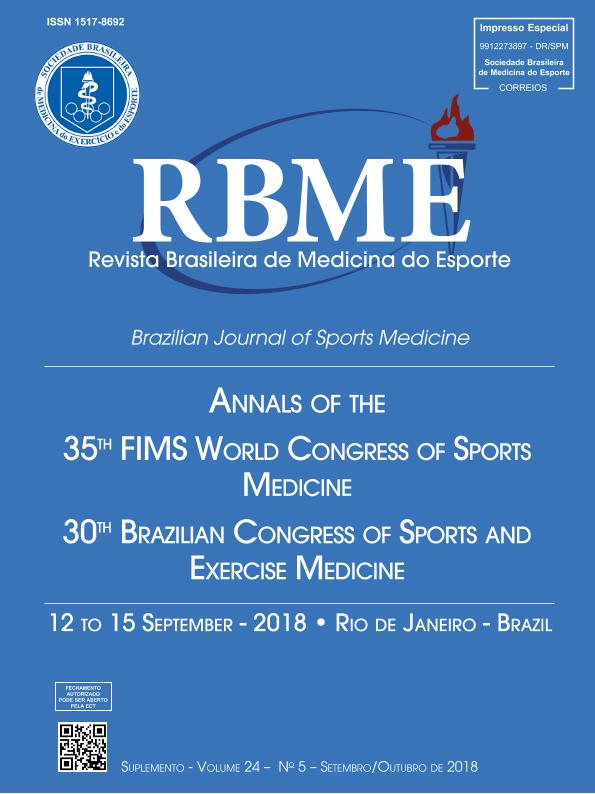Evento
Application of the Seattle criteria in the electrocardiographic assessment in federated athletes
Tipo del evento:
Congreso
Nombre del evento:
35th FIMS World Congress of Sports Medicine; 30th Brazilian Congress of Sports and exercise Medicine
Fecha del evento:
12/09/2018
Institución Organizadora:
Sociedade Brasileira do Medicina do Esporte;
Título de la revista:
Revista Brasileira de Medicina Do Esporte
Editorial:
Sociedade Brasileira de Medicina do Esporte
ISSN:
1517-8692
e-ISSN:
1806-9940
Idioma:
Inglés
Clasificación temática:
Resumen
The assessment of the electrocardiogram (ECG) in athletes remains controversial, with lack of standardization and difficulty in applyingspecific criteria in its interpretation. The main purpose of pre-competitive screening of athletes is to enable early (pre-clinical) identification of pathological conditionsassociated with increased risk of serious clinical events, including sudden death. The majority of disorders associated with an increased risk of sudden cardiac death (SCD)are suggested or identified by abnormalities on a resting 12-lead ECG. Whether used for the evaluation of cardiovascular-related symptoms, a family history of inheritablecardiac disease orpremature SCD, or for screening of asymptomatic athletes, ECG interpretation is anessential skill for all physicians involved in the cardiovascular care ofathletes.The purpose of this study was to assess variability in the interpretation of the ECG in athletesMaterial and Methods: The ECGs of 480 federated athletes were assessed, prospectively according to Seattle Criteria and the training in their reading provided by theBritish Journal of Sport Medicine. The study was performed from January 1st to May 31st 2018 in Morteros city (Córdoba province-Argentina) and was part of the medical examination of medium and high competence (EMMAC), mandatory by law since 2010. The average age ofathletes was of 16.51 years old (se = 0.40, min = 7, max = 64, N = 480). The most frequent sport practiced by athletes was soccer (71% of thecases) followed by basketball (14%) and volleyball (11%). The rest of the sports (eg. swimming, tennis, gymnastics) were scarcely represented (<2%). Of the 480 electrocardiogramsevaluated, 333 were normal electrocardiograms, 128 presented normal findings in athletes including sinus bradycardia and isolated voltage criteria for left ventricular hypertrophy (LVH), 9 were borderline and 30 presented pathological findings, 10 of these with signs of LVH. The borderline and pathological cases were derived to perform complementary studies such as Doppler echocardiogram, 24-hour holter, myocardial perfusion, etc. Studies demonstrate that without further education the ability of many physicians to accurately interpretan athlete's ECG is relatively poor and may lead to an unacceptable rate of false-positive interpretations and unnecessary secondary evaluations. However, providing physicians standardized criteria with which to evaluatean ECG considerably improves accuracy. While the ECG increases the ability to detect underlying cardiovascular conditions that place athletes at increased risk, ECG asadiagnostic tool has limitations in both sensitivity and specificity. Even if properly interpreted, an ECG will not detect allconditions predisposing to SCD. In addition, the true prevalence of specific ECG parameters in athletes and in diseases that predispose to SCD is often unknown and requires further study. The Seattle Criteria was developed with thoughtful attention to balance sensitivity (disease detection) and specificity (falsepositives), while maintaining a clear and usable checklist of findings to guide ECGinterpretation for physicians, including newlearners. Cardiac adaptation and remodeling from regular athletic training produces common ECG alterations that could be mistaken as abnormal. -The ECG interpretation guidelines presented and the online training program serve as an important foundation for improving the quality of ECG interpretations and the cardiovascular care of athletes. The interpretation of ECG according to the Seattle Criteria allowed recognizing patients with pathological findings and deriving them for their complete evaluation.
Archivos asociados
Licencia
Identificadores
Colecciones
Eventos(IMBIV)
Eventos de INST.MULTIDISCIPL.DE BIOLOGIA VEGETAL (P)
Eventos de INST.MULTIDISCIPL.DE BIOLOGIA VEGETAL (P)
Citación
Application of the Seattle criteria in the electrocardiographic assessment in federated athletes; 35th FIMS World Congress of Sports Medicine; 30th Brazilian Congress of Sports and exercise Medicine; Rio de Janeiro; Brasil; 2018; 116-116
Compartir




